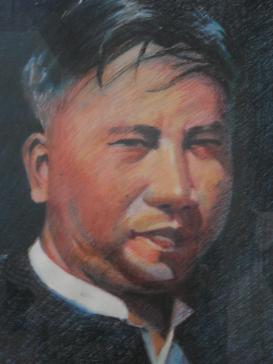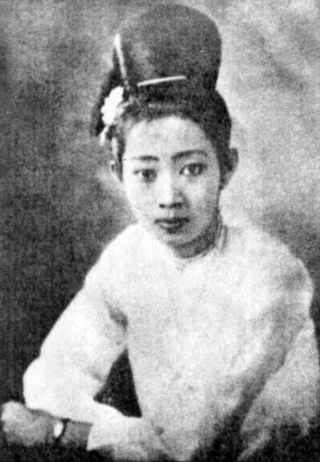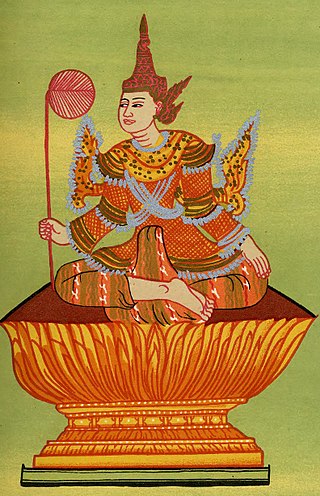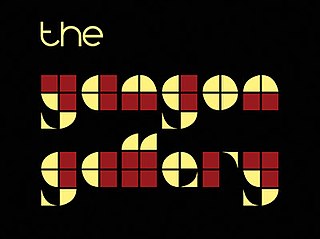
The University of Yangon, located in Kamayut, Yangon, is the oldest university in Myanmar's modern education system and the best known university in Myanmar. The university offers mainly undergraduate and postgraduate degrees programs in liberal arts, sciences and law. Full-time bachelor's degrees were not offered at the university's main campus after the student protests of 1996. The bachelor's degree was re-offered from 2014 on. Today degrees in Political Science are offered to undergraduate students, as well as postgraduate diplomas in areas such as social work and geology.

Ludu U Hla was a Burmese journalist, publisher, chronicler, folklorist and social reformer whose prolific writings include a considerable number of path-breaking nonfiction works. He was married to fellow writer and journalist Ludu Daw Amar.

Ludu Daw Amar was a well known and respected leading dissident writer and journalist in Mandalay, Burma. She was married to fellow writer and journalist Ludu U Hla and was the mother of popular writer Nyi Pu Lay. She is best known for her outspoken anti-government views and radical left wing journalism besides her outstanding work on traditional Burmese arts, theatre, dance and music, and several works of translation from English, both fiction and non-fiction.
The Beirut Stock Exchange is the principal and only stock exchange of Lebanon. Located in Beirut, it is a public institution run by a committee including a chairman, a vice-chairman and eight members appointed via a decree issued by the Council of Ministers, in accordance with a proposal by the Minister of Finance. All BSE members are Lebanese Joint stock companies (SAL) with a capital above £L500,000 and registered at the secretariat of the Commercial Register in. Members include holding companies and offshore companies. The BSE authorizes Brokerage firms the operation and trade in securities listed on the BSE according to the Bourse trading system and also lists the issuing companies that have any of their stocks or other financial instruments listed.
Myanmar National Literature Awards are awards presented to a Burmese author who has published a particularly lauded piece or body of work. There are awards for forms of writing ranging from poetry to novels. Many awards are also dedicated to a certain genre of fiction or non-fiction writing. Most literary awards come with a corresponding award ceremony.

The Church of the Province of Myanmar in Asia is a member church of the Anglican Communion. The province comprises the entire country of Myanmar. The current archbishop of Myanmar and bishop of Yangon is Stephen Than Myint Oo.
LCH is a financial market infrastructure company headquartered in London that provides clearing services to major international exchanges and to a range of OTC markets. The LCH Group includes two main entities: LCH Limited based in London and LCH SA based in Paris.

The Kingdom of Pinya, also known as the Vijaia State (၀ိဇယတိုင်း), was the kingdom that ruled Central Myanmar (Burma) from 1313 to 1365. It was the successor state of Myinsaing, the polity that controlled much of Upper Burma between 1297 and 1313. Founded as the de jure successor state of the Pagan Empire by Thihathu, Pinya faced internal divisions from the start. The northern province of Sagaing led by Thihathu's eldest son Saw Yun successfully fought for autonomy in 1315−17, and formally seceded in 1325 after Thihathu's death.
Kyar Ba Nyein was the Burmese Lethwei fighter and boxer who participated in boxing at the 1952 Summer Olympics and was a pioneer in modernizing Lethwei. Ba Nyein started boxing at the age of 13 and fought in about 50 matches over 20 years until retiring from fighting at the age of 33.

Tarabya was king of Ava for about seven months in 1400. He was the heir apparent from 1385 to 1400 during his father King Swa Saw Ke's reign. He was a senior commander in Ava's first three campaigns (1385−91) against Hanthawaddy Pegu in the Forty Years' War. He was assassinated seven months into his rule by his one-time tutor, Gov. Thihapate of Tagaung. The court executed the usurper, and gave the throne to Tarabya's half-brother Min Swe.
Myanma Economic Holdings Public Company Limited is one of two major conglomerates run by the Burmese military, the other being the Myanmar Economic Corporation (MEC). MEHL business interests include banking, construction, mining, agriculture, tobacco and food.
Zaykabar Company Limited is a major Burmese conglomerate with interests in construction and telecommunications. The company was founded by Khin Shwe in 1990. Zaykabar and its owner Khin Shwe have been placed on the American sanctions list since 2007, for its close ties with the Burmese military.

Japan Exchange Group, Inc., abbreviated as JPX or Nippon Torihikijo, is a Japanese "financial instruments exchange holding company" subject to the regulations of the Financial Instruments and Exchange Act enforced by the Financial Services Agency. JPX owns three licensed "financial instruments exchange" corporations: Tokyo Stock Exchange, Inc. (TSE), Osaka Exchange, Inc. (OSE), and Tokyo Commodity Exchange, Inc. (TOCOM). It was formed by the merger of TSE and OSE on January 1, 2013. As a result of this merger and market reorganization, TSE became the sole securities exchange of JPX and OSE became the largest derivatives exchange of JPX. In 2019, JPX acquired TOCOM to expand derivatives trading business in the commodity market. It also has an IT services and research arm, JPX Market Innovation & Research, Inc. (JPXI), a self-regulatory body, Japan Exchange Regulation (JPX-R), and a central clearing counterparty, Japan Securities Clearing Corporation (JSSC). As of June 2021, it is the world's fifth-largest stock exchange operator, behind NYSE, NASDAQ, SSE, and HKSE.
The Rangoon Stock Exchange was a secondary over-the-counter (OTC) stock market that operated in Yangon from the 1930s to 1941 and from the late 1950s to the early 1960s. The fledgling exchange, operated by seven European firms, was a secondary OTC market for a few British and American stocks with most of the quotes sourced from Calcutta and Bombay Stock Exchanges. It closed down at the outbreak of World War II in 1941. It was revived in the late 1950s to trade shares of nine public-private joint-venture corporations. But this OTC market too died in the 1960s when all the firms were nationalized by Gen. Ne Win's military government that seized power in 1962.

The Yangon Gallery is a contemporary art center located at People's Square and Park which is one of the most historic places in Myanmar. The Yangon Gallery organizes events of all art forms including painting, fashion, photography, music, film, documentary and literature. The Yangon Gallery is one of the art spaces in Yangon which can host all artistic platforms.

Myanma Economic Bank is a commercial public bank in Myanmar (Burma).
The Yangon Stock Exchange opened in December 2015, at the former Central Bank of Myanmar and Myawaddy Bank headquarters in Yangon. On 23 December 2014, two Japanese firms, Daiwa Institute of Research, the research arm of Daiwa Securities Group and Japan Exchange Group, established a joint venture with the state-owned Myanma Economic Bank to establish this stock exchange. The joint venture firm, the Yangon Stock Exchange-Joint Venture Limited will have a working capital of US$31 million. The Securities and Exchange Commission has selected Kanbawza Bank to be YSX' settlement bank.
Yoma Central is a major mixed-use development project in Downtown Yangon, Myanmar, located at the intersection of Bogyoke Aung San Road and Sule Pagoda Road, beside Bogyoke Aung San Market. The development entails a number of buildings, including the historic Myanma Railway headquarters first built in 1877, two new office towers, luxury residencies, and a business hotel. The development will eventually encompass 2,440,000 square feet (227,000 m2). Groundbreaking was held on 16 January 2017. Following the 2021 Myanmar coup d'état, construction of the site, including a hotel, was paused in June 2021.








